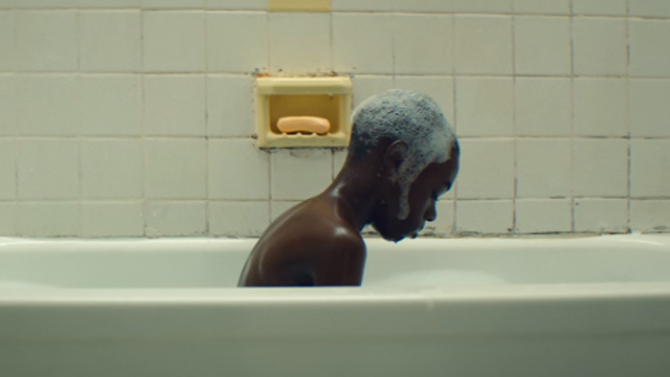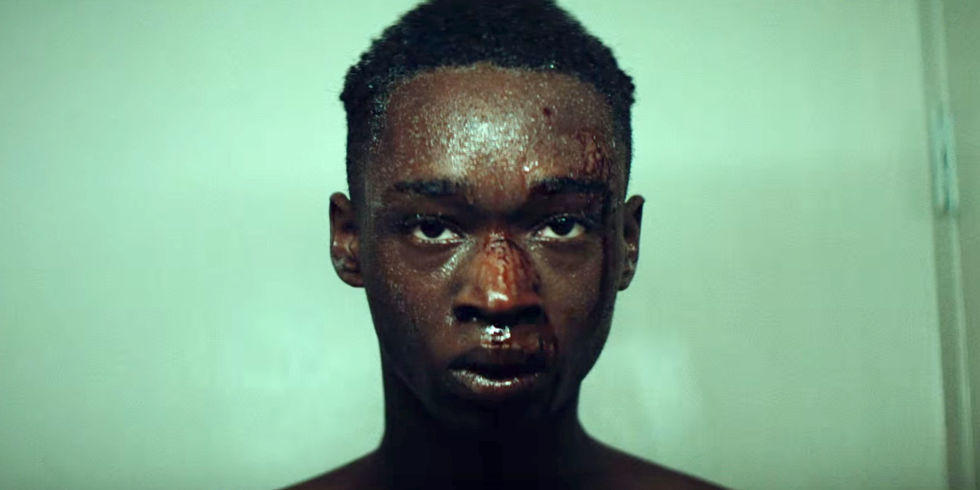They say write what you know. Who’s they? Doesn’t matter. While I don’t know what it’s like to grow up black and gay in America, I do know good movies when I see them (usually). Moonlight is a good movie about growing up black and gay and male in America. The main character, Chiron, grows up in Florida, where the director and myself were born, so I do know that fairly well. But since I’m a straight white guy who did not grow up in the projects of Florida I can’t say that I know the world on display in this film. Fortunately, the masterful writing and direction of Barry Jenkins presents this world in an intimate enough manner that any human with a functioning heart will appreciate.

Moonlight is split into three acts that each focus on a transformative time in Chiron’s life and the relationships that inform his sexual discovery. We’re introduced to him as a young elementary school boy who has been given the moniker “Little” because he is, in fact, smaller than the average bear of his age. He is often picked on due to his stature and his lack of enthusiasm for the homoerotic games of his peers. Ironically he is labeled as a faggot by those same peers and struggles with the meaning behind this tag. Chiron (Alex R. Hibbert) seeks refuge and advice from a local drug dealer, Juan (Mahershala Ali), because he gets neither from his own mother (Naomie Harris), who is an abusive drug user. This first act focuses on the confusion that plagues young homosexuals who are brought up in an unaccepting environment. One of the stronger moments here comes when Chiron asks Juan what a faggot is and if he is one. The scene is played out sweetly and with earned levity as Juan and his lady Teresa (Janelle Monae) grapple with how to help this lost boy.

From this period of youth and befuddlement the second act moves to the growing anger that can manifest during the high school teenage hormoney years. The bullying Chiron (now played by Ashton Sanders) faces increasingly aggressive and violent bullying as his support system dwindles even further. Deeper exploration into his own sexuality is coupled with further heartbreak. This movie is definitely tough to watch and kudos to the team behind it for not going soft on the pressure points. The balance of the most beautiful moments with the most painful add depth and weight to both ends of the scale. No pulled punches here.

Yoda from Star Wars: The Phantom Menace famously said, “Fear leads to anger, anger leads to hate, hate leads to suffering.” Barry Jenkins definitely saw this movie and probably used this quote as a template. If Yoda was in Moonlight he would probably say: “Confusion leads to anger, anger leads to hate, hate leads to denial.” The third act of this movie shows Chiron as now a yoked 20-something who has transitioned into dealing the same drugs that had such a negative impact on his own youth. He now goes by “Black” and denies his sexuality while trying to use the anger that lead him there to be a menacing business man. I’m not buying the menace, and Trevante Rhodes—who portrays this version of Chiron—is probably doing the best work among the 3 actors. He does so well at carrying the baggage of the other acts that he wasn’t even involved in that you could think this movie was a Boyhood ripoff. But each Chiron actor could be someone’s favorite Chiron because each nail the stoic, passive, angry, hurt boy in excellent and specific fashion. In fact, all the acting is totally on point, even Janelle Monae.
Moonlight, much like this review, ends in a way that is both satisfying and leaving you wanting more. When it’s all said and done, Chiron’s arc is completed but the future is left to debate. It’s an ambitious journey to tackle in one film but each step is portrayed with the delicacy that the reality of the situation needs to ground it properly. The entire composition is propped up on dynamic cinematography and moving sound direction. As a whole Moonlight strives to paint a diverse picture of this specific kind of human struggle in an effort to display how multifaceted it is. At times I was so emotionally invested that I had to remind myself that I was in a theater full of people. It’s a feeling I haven’t had at a movie theater since seeing Her. The difference when watching Her was that the intimacy and love between man and machine made me uncomfortable to the point where I would have preferred seeing it away from strangers. With Moonlight, I was carried away with my love for this world and happy to be able to share that love with those around me. It’s a film that would be groundbreaking in decades prior and obviously it’s a good thing that it’s more normalized today. That being said, the topic of gay black men in America is not covered very often and I can’t imagine in more spectacular manner. I hope this film gets the attention it deserves and Barry Jenkins will be on my radar from now on.

Leave a Reply